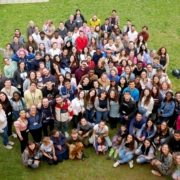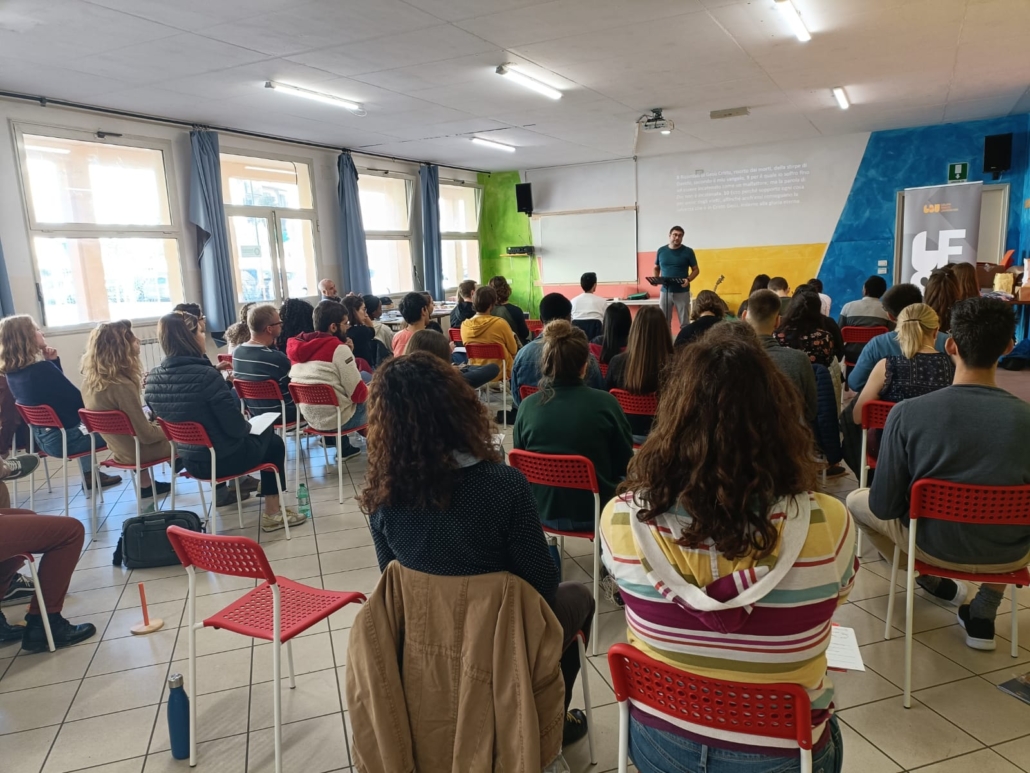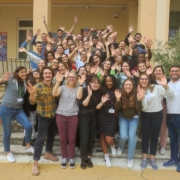Johan (on the right in the photo, alongside the GBU Board) shares his story in this interview. His time as General Secretary (GS), the evolution of GBU, his future, and his advice for Francesco (on the left in the photo), the new General Secretary.
Johan, you’re stepping down as General Secretary this year after how many years?
I became GS in 2009/2010, so officially it’s been 15 years. But in reality, I was already active as GS from 2005 because I was President of the GBU Association, and I took care of some aspects of the GS role, which didn’t exist at the time. So, it’s either 15 or 20 years!
So, we can call this a moment of great change in your life and in GBU’s history. How did you come to this decision? Wait… were you fired?
Yes, finally I can say it officially: they got rid of me (laughs). Actually, the term of a GS, by statute, is five years renewable. After these five years, we ask ourselves whether to continue or not. Twice, the Board and I chose to continue.
After the first five years, I felt there was still much I could give, and it was easy to decide to continue, together with the Board. Five years ago, however, was a somewhat particular period, especially from an administrative and GBU development point of view, so it was also a necessity.
I loved being the GS of GBU and I had many satisfactions and blessings in these 20 years of teamwork. Today, the Staff team is full of capable people, and I felt it was the right time to make room for others to exercise their gifts in this role.
What will you do now? Will you remain involved with GBU?
Three years ago, IFES asked me if I wanted to commit to their Governance program, which involves training the Boards of GBU groups in various countries around the world. It was a proposal in line with my gifts and passions, because I will be dealing with leadership and structure. So I accepted the proposal, aware that it was not compatible with the GS role.
It seems the timing was good.
Yes. A prospect of service in IFES at a time when I was starting to think that someone else could continue as GS with GBU. The desire to leave the role to someone else after about 20 years coincided with the arrival of this proposal to be more involved in this IFES program, where I was already involved since 2019 as a TRAINER, to help the various Boards of GBU groups internationally.
Now a question that to answer properly might require writing a book (why not do it?!)… Thinking about these 20 years, what was GBU like when you started as GS and what is it like now?
This is probably the most encouraging and blessed aspect of these years. We started from a much smaller GBU, in terms of the number of national groups, students involved, and Staff around Italy, but also in terms of donations and finances in general. Looking at the numbers, it’s a completely different GBU.
Looking at what GBU does and its mission, the roots are the same. The passion is the same, as is the centrality of the student and consequently the vision of Sharing Jesus from Student to Student. All these things have remained almost the same.
In these years, we have added a lot of structure around these foundations. For example, today we have a path to train coordinators, the same for Staff in Training. As we grew, it was necessary to add structure because the risk would have been an isolated and detached growth, while this way there is organized and homogeneous growth. Today we are still a student movement founded on students, but in some ways, we are a more structured and connected organization, more capable of relating to different churches from different contexts, with more students, with a richer Staff team, whilst being present in more university cities.
What happens now? Will you remain involved with GBU? What will your role be?
My work in IFES will not take up all my time. I will certainly remain available to the GBU and the new GS. There will be a transition period between me and Francesco, to give him and all the Staff time to get used to the new setup. After that, I will still be available to the GBU. Certainly, there are areas where I could continue to serve with some of my specific gifts, without conflict with the GS role or with Francesco, also considering his gifts, which are many and different from mine.
Francesco will be the new GS of GBU and will certainly appreciate some advice from you! What advice would you like to give him?
In these months, I’ve thought about it several times, because I’ve analyzed the good things and the less good things of my journey. I wouldn’t want to give Francesco a list, but rather share some reflections
I believe that Francesco should feel free to use the many gifts God has given him and his passions, and lead GBU through them, towards the goals we have before us. In doing so, I hope he will want to preserve the structure we have managed to create in these years, or at least improve or adapt it to the times, to remain stable on a foundation that is necessary, and that also allows him to freely exercise his gifts and help GBU to “change” in the things he feels need to be changed, created, or implemented. I am sure he will find his space and his personal way to carry out the role of General Secretary.
I hope he continues to do collaborative work, where every element of GBU feels part of the family. This will become increasingly complicated as we grow, we have seen it in the last ten years; similarly, there are different ways to involve everyone, especially for those strategic aspects that concern long-term work. It will be important that this is maintained.
I am confident that the Board has made an excellent choice. I am certain that Francesco will bring valuable and unique contributions, different from mine. I trust that the Lord will continue to bless the GBU and guide all of us in our work of sharing the Gospel in universities.
by Domenico Campo, GBU Staff Worker in Sicily









